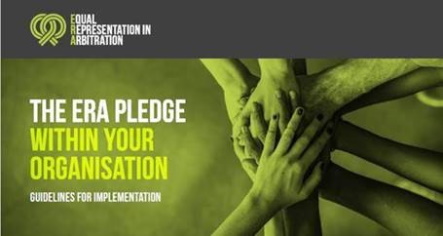New ERA Pledge Corporate Guidelines Aim to Assist Corporations in Promoting Women in Arbitration

Since its launch more than five years ago, the Equal Representation in Arbitration (ERA) Pledge has offered concrete and actionable steps to help address the underrepresentation of women in the arbitration community.
The ERA Pledge has two primary objectives:
- to improve the profile and representation of women in arbitration, and
- to promote the appointment of women as arbitrators on an equal opportunity basis.
At the end of 2020, the ERA Pledge’s Corporate Subcommittee published a set of Corporate Guidelines for Implementation of the Pledge (“Pledge Corporate Guidelines”). The Pledge Corporate Guidelines provide corporate signatories with practical tools to assist them in implementing the ERA Pledge within their organizations.
The Pledge Corporate Guidelines can be adopted and applied when and to the extent appropriate by Pledge corporate signatories. The guidelines are designed to operate as proposed best practices and do not impose a binding commitment to any specific conduct.
The Pledge Corporate Guidelines were drafted by the Pledge Corporate Subcommittee members with the support of an array of companies, including Airbus, Anglo American, BP, Burford Capital, Chevron, ConocoPhillips, Omni Bridgeway, Shell, and Vannin Capital. Omni Bridgeway’s Dana MacGrath, who is responsible for leading the company's investments in international arbitration matters, serves on the Pledge Steering Committee and Corporate Subcommittee and was among those who assisted in drafting the guidelines.
THE PLEDGE CORPORATE GUIDELINES PROVIDE PRACTICAL STEPS FOR CORPORATES
The new guidelines may serve as a tool for corporates to help bring diversity into discussions around arbitrator appointments and to take specific steps to promote diversity.
A few of the recommended steps for those involved in the appointment of arbitrators include: considering the appointment of women as arbitrators on an equal opportunity basis; endeavoring to ensure that any list of potential arbitrator candidates includes a fair representation of women; calling out lists of arbitrators that lack diversity and encouraging further consideration of equally qualified female candidates. (A full list of the proposed best practices for those involved in the appointment of arbitrators is available at the ERA Pledge website.)
The guidelines also include proposed best practices for those involved in selecting external counsel teams for arbitrations, encouraging corporates to select external counsel teams that are diverse in a way that is consistent with each organization’s respective diversity and inclusion policies and practices.
In addition, the guidelines provide steps to try to ensure that principles are followed in the workplace. Corporate representatives are encouraged to familiarize themselves with the ERA Pledge and Pledge Corporate Guidelines, to share them with colleagues, and to provide female colleagues with equal opportunities to network and raise their profiles within the arbitration community.
THE ERA PLEDGE HAS PROMOTED MEANINGFUL CHANGE
Since its launch, the ERA Pledge has garnered more than 4,000 individual and organizational signatories. And in the initial years after its creation, the percentage of female arbitrators sitting on tribunals more than doubled, increasing from 10 percent to 21.5 percent. Much of that increase is attributed to steps taken by arbitral institutions to promote gender diversity in tribunal appointments. For example, in 2019, 34 percent of institutional appointments were female; by comparison, 13.9 percent of the party appointments made in 2019 were female, according to data cited by the ERA Pledge. It became apparent that empowering corporates – the parties in arbitration – to implement the Pledge was an important step to undertake and resulted in the issuance of the Pledge Corporate Guidelines.
Well-qualified female arbitrator candidates often lack visibility and historically tribunals often were composed from a relatively small pool of mostly male arbitrator candidates. Relying on a small pool can result in a perceived lack of legitimacy for the arbitration process and create procedural inefficiencies as well. A broader pool of arbitrators can help solve these problems and build greater diversity in the international arbitration system.
While arbitral institutions may have a wider view of all available arbitrator candidates, corporate parties may rely on lists provided by external counsel. By signing the ERA Pledge and embracing the Pledge Corporate Guidelines, a corporation can signal to outside counsel that it seeks a broader and more gender-balanced arbitrator selection process and supports the creation of equal opportunities for qualified female candidates.
To learn more about the ERA Pledge and the new Pledge Corporate Guidelines, visit arbitrationpledge.com. For information about Omni Bridgeway’s litigation funding capabilities, visit our Company Insights. While there, explore our recent podcasts, blog posts, and videos. Or contact us for a consultation to learn more about the ways we can help you pursue meritorious claims.